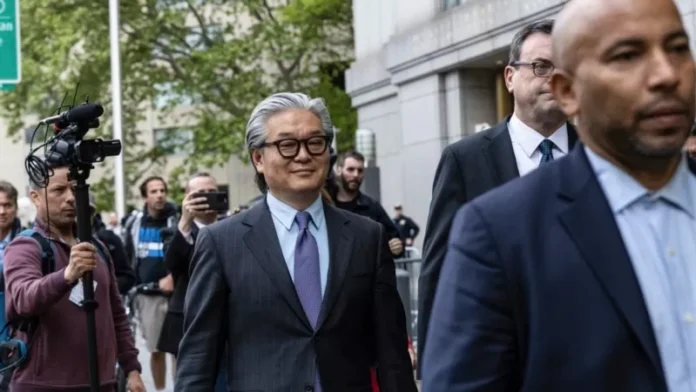The trial of Archegos founder Bill Hwang for alleged securities fraud and market manipulation opened in New York on Monday, drawing attention to the spectacular collapse of the family-owned hedge fund in 2021. The trial, which has been closely watched by the financial world, sheds light on the risky and deceptive practices that led to the fund’s downfall and caused billions of dollars in losses for major banks.
Hwang and his chief financial officer, Patrick Halligan, were arrested by the FBI in April 2022 for their involvement in the collapse of Archegos. The charges against them include securities fraud and market manipulation, which have been described as jeopardizing not only their own company but also innocent investors and financial institutions around the world.
According to the indictment, Hwang and his co-conspirators used Archegos as a tool for market manipulation and fraud, causing significant consequences for other participants in the U.S. securities markets. They deceived investors by falsely inflating the prices of stocks in the fund’s portfolio, leading others to trade and extend credit to the firm based on false information.
The fund’s strategy was to take huge bets on a few stocks using borrowed money from banks, a practice known as leverage. However, when some of these bets turned sour, the fund was unable to meet margin calls to cover the losses, resulting in its collapse. This not only caused significant losses for the fund but also had a ripple effect on major financial institutions such as Credit Suisse, Nomura, and Morgan Stanley, who collectively lost $10 billion.
Prosecutor Alexandra Rothman described Hwang as a billionaire who risked everything for more money, success, and power. She stated that Archegos was a “house of cards built on manipulation and lies,” as reported by The Wall Street Journal. The indictment also revealed that Hwang’s personal fortune had soared from $1.5 billion to $35 billion in just a year, making him and the firm significant players in the U.S. securities markets.
The fund’s use of derivatives to take large stakes in top Chinese and U.S. companies initially paid off, with the fund’s value tripling in just a year. However, this success was short-lived as the fund’s expansion was based on artificially inflated share prices, causing it to grow rapidly and reach a peak value of $36 billion with $160 billion in exposure.
The U.S. Securities and Exchange Commission (SEC), the market regulator, also highlighted Hwang’s past involvement in insider trading. In 2012, he paid $44 million to settle with the SEC over an insider trading case and shut down his previous firm, Tiger Asia Management. This raises questions about Hwang’s character and his disregard for ethical and legal boundaries in his pursuit of wealth and success.
Hwang’s rise to prominence in the financial world began with his studies in the United States and his work at Tiger Management. However, his actions have tarnished his reputation and brought into question the integrity of his business practices. The trial will determine whether Hwang and his co-conspirators will be held accountable for their actions and serve as a warning to others who may engage in similar fraudulent activities.
The collapse of Archegos has shed light on the dangers of risky and deceptive practices in the financial world. It has also highlighted the need for stricter regulations and oversight to prevent such incidents from happening in the future. The trial serves as a reminder that the pursuit of wealth and success should not come at the expense of ethical and legal boundaries.
In conclusion, the trial of Bill Hwang and Patrick Halligan has brought to light the deceptive and manipulative practices that led to the collapse of Archegos and caused significant losses for major financial institutions. It serves as a cautionary tale and a call for stricter regulations to prevent such incidents from happening in the future. The outcome of the trial will determine the fate of Hwang and his co-conspirators and send a strong message to those who may engage in similar fraudulent activities.

